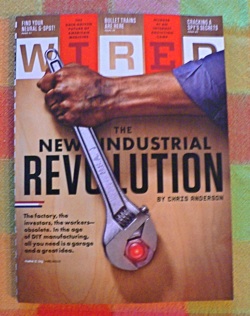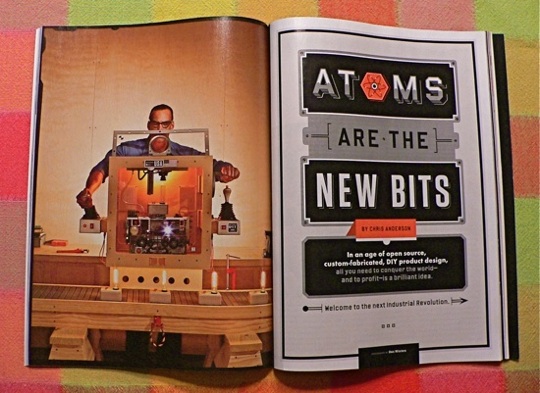 I absolutely love it when my new WIRED magazine shows up in the mail. Hey, I read as much as the next guy online (on my little 13″ Macbook screen, or my iPhone), but I still love excellence in print — good ol’ ink on dead trees. And WIRED continues to stand out in this category. (Bonus: having a print subscription means I can read the latest issue before others can online.) The February 2010 edition has another hard-hitting cover story, as only this publication can do, declaring with bold artwork: “The New Industrial Revolution.” These guys know how to sell magazines! I especially liked the title of the article, which I saw as I quickly flipped to the table of contents: “Atoms Are the New Bits.” And it’s by none other than editor-in-chief Chris Anderson. This has been a favorite discussion topic of mine with some of my colleagues. Yes, there’s quite a bit more to life, and innovation, than just digital stuff.
I absolutely love it when my new WIRED magazine shows up in the mail. Hey, I read as much as the next guy online (on my little 13″ Macbook screen, or my iPhone), but I still love excellence in print — good ol’ ink on dead trees. And WIRED continues to stand out in this category. (Bonus: having a print subscription means I can read the latest issue before others can online.) The February 2010 edition has another hard-hitting cover story, as only this publication can do, declaring with bold artwork: “The New Industrial Revolution.” These guys know how to sell magazines! I especially liked the title of the article, which I saw as I quickly flipped to the table of contents: “Atoms Are the New Bits.” And it’s by none other than editor-in-chief Chris Anderson. This has been a favorite discussion topic of mine with some of my colleagues. Yes, there’s quite a bit more to life, and innovation, than just digital stuff.
In the article, Anderson chronicles the age of “open source, custom-fabricated, DIY product design.” He profiles a fascinating startup called Local Motors of Wareham, Mass., and another one called TechShop of Menlo Park, Calif. (which I first heard of when I met the founder at a DEMO Alumni Reception in Palo Alto in August 2007).
 “The tools of factory production, from electronics assembly to 3D printing, are now available to individuals, in batches as small as a single unit.”
“The tools of factory production, from electronics assembly to 3D printing, are now available to individuals, in batches as small as a single unit.”
Yep, a lot of this is driven by 3D printers, which you’ll remember, if you’ve been reading Minnov8 lately, is a product category well represented in Minnesota by Stratasys — which has come a long way from its startup days here in the 1980s. See this post by Steve Borsch from January 21, about the company’s partnership with HP that caused its stock to rocket 44% in one day. But the WIRED article talks about sub-$1000 printers, a part of the market in which Stratsys does not have an offering. As Steve mentioned in his post the other day, a main player in the low-priced sector of the 3D printer market is the open-source company MakerBot. But, according to this PC World article, 3D Printing Coming to the Desktop, the HP-Stratasys models, though small enough to sit on a desktop, are priced just shy of $15,000. Sure, the talk about this HP partnership is the promise of prices dropping with volume. But one has to wonder…
Is a once-promising, emerging Minnesota technology pioneer looking at the possibility of having its lunch eaten by an open-source disruptor like MakerBot?
That question may take years to play out. We can only hope that Stratasys management, surely feeling its oats now after the HP deal, is up to the task. Meantime, the promise of “custom-fabricated DIY design” brings much hope to Minnesota’s still healthy small manufacturing sector, which has remained relatively stable despite the recent recession. For more about this important part of our state’s economy, check out the site of an organization called Enterprise Minnesota, and the latest issue of its magazine.
Another connection to the DIY product design and manufacturing movement here in Minnesota is a locally connected TV show called MAKEzine. This is a national series from MAKE magazine, Twin Cities Public Television, and American Public Television. According to the web site, “It celebrates ‘Makers’ – the inventors, artists, geeks, and just plain everyday folks who mix new and old technology to create new-fangled marvels.” The series is sponsored by Minnesota’s own Geek Squad, a business unit of Twin Cities-based Best Buy.
I asked a local startup founder, one I knew had experience with both software and hardware development, for his reaction to this WIRED cover story. Matt Bauer is the founder of PedalBrain (www.pedalbrain.com): “I own one of Stratasys’s desktop printers. I evaluated MakerBot’s offering and there isn’t any comparison,” he said. “The uPrint from Stratasys completely destroys the MakerBot in every category except price. For that additional cost, though, I don’t have to worry about the uPrint working. It can run nearly 24/7 without anyone taking care of it. The same can’t be said for the MakerBot.” So, how does he see the battle for this product category playing out? “I’m sure this gap will close, and I see Stratasys getting the win. It’s much easier coming down in cost than going up in technology.”